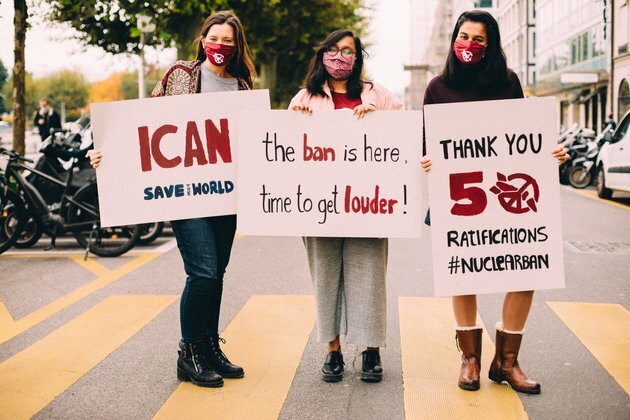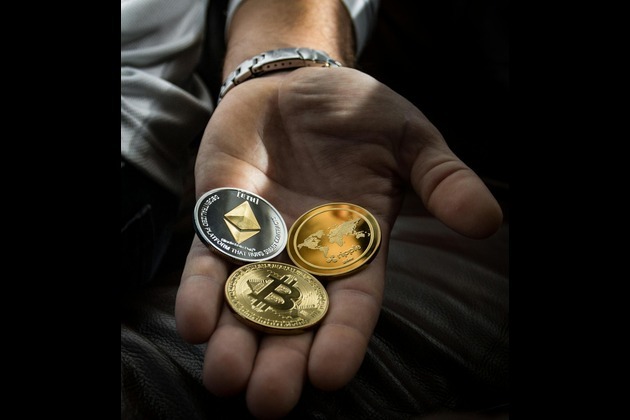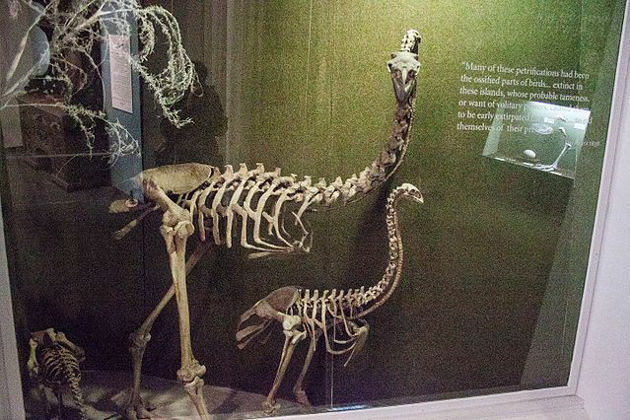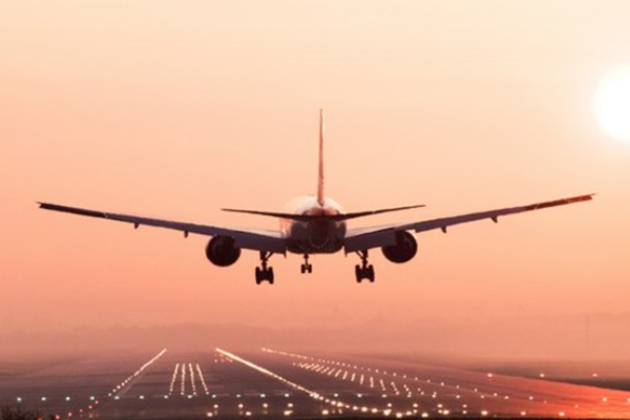Why the Treaty Banning Nuclear Weapons Makes a Difference
Pressenza
22 Jan 2021, 15:57 GMT+10

The Treaty for the Prohibition of Nuclear Weapons (TPNW) goes into effect on January 22, 2021. Most Americans haven't heard of it. It's a treaty that prohibits the developing, testing, possessing, using, threatening to use, or storing of nuclear weapons. Critics say the treaty is pointless because it only applies to the countries that signed it and none of the nuclear-armed states are signing on. But the Treaty for the Prohibition of Nuclear Weapons is important and will have a critical impact.
Not because it will force countries to retire nuclear weapons, but because it will change the way people think about nuclear weapons.
How people think matters when it comes to nuclear weapons because nuclear weapons are the most important military symbol in the world today. They are the international currency of power. Currencies of power are types of weapons that are taken to be symbols of national strength. Battleships, for example, were the currency of power at the turn of the twentieth century. In the medieval world, heavily-armored mounted knights were the currency of power. Currencies of power bring prestige to their owners, they often incite arms races, and people tend to use them as a rough guide to a nation's strength. Want to know how powerful a country is? In the early 1900s, you count the number of battleships; today we count nuclear weapons.
We don't often think of them that way, but nuclear weapons are actually two things at once. They are both military weapons designed to explode, and symbols designed to impress, awe, and deter. Nuclear weapons work in the everyday world of experiences. Symbols work only inside peoples' heads.
Most ordinary people rarely give the military aspect of nuclear weapons serious thought. They couldn't tell the difference between a SLBM and an ALCM, would be unable to do realistic calculations of strategic damage, much less have accurate ideas of how many weapons the world's various powers possess. Without ever having measured, I am confident that there are more Americans today who could explain the attacking style of Barcelona's soccer team (much less the various offensive weapons at the disposal of the Kansas City Chiefs) than could describe the United States' nuclear arsenal in any detail. For them, nuclear weapons are mental images of giant clouds, vague notions of "the most" destruction, an awed tone of voice when the subject comes up, and harbingers of the end of the world. For most Americans, nuclear weapons are far more symbol than reality. And for those people - for people who only know nuclear weapons as symbols - the TPNW will come as a shock.
If you have always been told that everyone really wants nuclear weapons, and if you have come to think of them as the most desirable weapon in existence, you will be dumfounded to hear that 122 countries voted for the treaty, that eighty have signed it, and that fifty have ratified it. Who in their right mind could not want the most powerful weapon ever? Some people, no doubt, will dismiss those fifty nations with the thought that all foreigners are crazy. But for some, the TPNW will challenge important assumptions they have accepted for years. It will set up a cognitive dissonance, like a clanging in their heads, that will trouble them. For some, it will lead them to try to find out more - to resolve this mystery of how some nations could not want the "most powerful weapons ever."
And that is the power of the TPNW. It will challenge old assumptions. It will create uncomfortable mental contradictions. It will plant seeds of doubt. It might even cause people to reevaluate.
Important ideas and assumptions about nuclear weapons have lain largely unchallenged since the Cold War - beliefs about the importance and influence of nuclear weapons that have been taken for granted since Truman or Ike or Herman Kahn first articulated them. The power of the TPNW is not in the practical changes it makes in the world. The power of it lies in the way it will serve as a catalyst for new and perhaps surprising thoughts.
If the comfortable certainty that "everyone wants nuclear weapons" is not true, perhaps there are other assumptions from the Cold War that are not true. Perhaps it makes sense to look more closely at the "can't disinvent nuclear weapons" argument? Maybe it's time to explore how a weapon that appears to be so militarily useless (if it were useful, wouldn't it have been used?) could be thought of as vital to security?
The TPNW is powerful because it is undeniable proof that at least one of the core assumptions of the Cold War was wrong. It will force some of us here in the United States to rethink our beliefs. And rethinking is a slippery process. Once you start to question core beliefs, who knows where it will end?
 Share
Share
 Tweet
Tweet
 Share
Share
 Flip
Flip
 Email
Email
Watch latest videos
Subscribe and Follow
Get a daily dose of Travel Trade news through our daily email, its complimentary and keeps you fully up to date with world and business news as well.
News RELEASES
Publish news of your business, community or sports group, personnel appointments, major event and more by submitting a news release to Travel Trade.
More InformationBusiness
SectionBitcoin soars to a record on Trump policies, institutional demand
NEW YORK CITY, New York: Bitcoin surged to a new all-time high this week, buoyed by growing institutional interest and a wave of pro-crypto...
Huawei eyes new buyers for AI chips amid U.S. export curbs
SHENZHEN, China: As global chip competition intensifies, Huawei Technologies is exploring new markets in the Middle East and Southeast...
U.S. food prices at risk as Brazil tariff hits key imports
LONDON/NEW YORK CITY: American grocery bills may be headed higher as coffee and orange juice prices face upward pressure from new tariffs...
WK Kellogg sold to Ferrero as food giants chase shelf power
BATTLE CREEK, Michigan: In a major consolidation of iconic food brands, WK Kellogg has agreed to be acquired by the owner of Ferrero...
Filmmaker joins biotech effort to bring back extinct giant bird
WASHINGTON, D.C.: Filmmaker Peter Jackson's lifelong fascination with the extinct giant New Zealand flightless bird called the moa...
India seeks WTO nod for retaliatory tariffs on US
NEW DELHI, India: India has submitted a revised proposal to the World Trade Organization (WTO) in Geneva to implement retaliatory tariffs...
Airlines
SectionTravelers can now keep shoes on at TSA checkpoints
WASHINGTON, D.C.: Travelers at U.S. airports will no longer need to remove their shoes during security screenings, Department of Homeland...
Two passengers offloaded from SpiceJet Flight after attempting to approach cockpit
New Delhi [India], July 15 (ANI): A SpiceJet flight from Delhi to Mumbai on Monday handed over two passengers to CISF for their unruly...
DGCA asks airlines to conduct fuel switch inspections on Boeing aircraft by July 21
By Shafali Nigam New Delhi [India], July 14 (ANI): India's civil aviation regulator, Directorate General of Civil Aviation (DGCA)...
CM Mohan Yadav woos global investors for Madhya Pradesh in UAE
Dubai [UAE], July 14 (ANI): Madhya Pradesh Chief Minister Mohan Yadav, currently on an official visit to the UAE as part of the MP...
MP CM Mohan Yadav meets UAE Chambers Secy General, promotes bilateral investment opportunities
Dubai [UAE], July 14 (ANI): Madhya Pradesh Chief Minister Dr Mohan Yadav met industry leaders in the UAE's trade sector during his...
Cargo truck hits parked Akasa Air aircraft at Mumbai Airport; no injuries reported
Mumbai (Maharashtra) [India], July 14 (ANI): A parked Akasa Air aircraft was struck by a cargo truck operated by a third-party ground...













